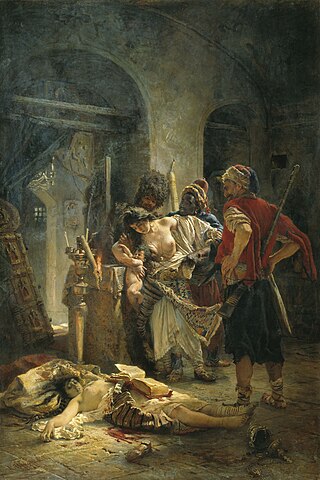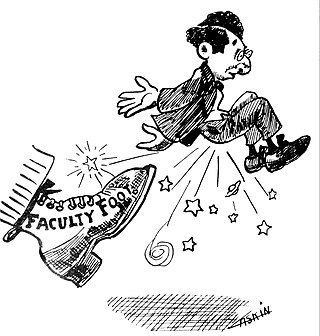
Theft is the act of taking another person's property or services without that person's permission or consent with the intent to deprive the rightful owner of it. The word theft is also used as a synonym or informal shorthand term for some crimes against property, such as larceny, robbery, embezzlement, extortion, blackmail, or receiving stolen property. In some jurisdictions, theft is considered to be synonymous with larceny, while in others, theft is defined more narrowly. A person who engages in theft is known as a thief.

Political corruption is the use of powers by government officials or their network contacts for illegitimate private gain. Forms of corruption vary but can include bribery, lobbying, extortion, cronyism, nepotism, parochialism, patronage, influence peddling, graft, and embezzlement. Corruption may facilitate criminal enterprise, such as drug trafficking, money laundering, and human trafficking, although it is not restricted to these activities.

A vice is a practice, behaviour, or habit generally considered morally wrong in the associated society. In more minor usage, vice can refer to a fault, a negative character trait, a defect, an infirmity, or a bad or unhealthy habit. Vices are usually associated with a fault in a person's character or temperament rather than their morality.

Bribery is the offering, giving, receiving, or soliciting of any item of value to influence the actions of an official, or other person, in charge of a public or legal duty and to incline the individual to act contrary to their duty and the known rules of honesty and integrity. With regard to governmental operations, bribery is essentially corrupt "solicitation, acceptance, or transfer of value in exchange for official action".
Cronyism is a specific form of in-group favoritism, the spoils system practice of partiality in awarding jobs and other advantages to friends or trusted colleagues, especially in politics and between politicians and supportive organizations. For example, cronyism occurs when appointing "cronies" to positions of authority regardless of their qualifications. This is in contrast to a meritocracy, in which appointments are made based on merit. Politically, "cronyism" is derogatorily used to imply buying and selling favors, such as votes in legislative bodies, as doing favors to organizations, or giving desirable ambassadorships to exotic places.

Sacrilege is the violation or injurious treatment of a sacred object, site or person. This can take the form of irreverence to sacred persons, places, and things. When the sacrilegious offence is verbal, it is called blasphemy, and when physical, it is often called desecration. In a more general sense, any transgression against what is seen as the virtue of religion would be a sacrilege, and so is coming near a sacred site without permission.

Dismissal is the termination of employment by an employer against the will of the employee. Though such a decision can be made by an employer for a variety of reasons, ranging from an economic downturn to performance-related problems on the part of the employee, being fired has a strong stigma in some cultures.

The Foreign Corrupt Practices Act of 1977 (FCPA) is a United States federal law that prohibits U.S. citizens and entities from bribing foreign government officials to benefit their business interests.

Irrumatio is a form of oral sex in which someone thrusts their penis into another person's mouth, in contrast to fellatio where the penis is being actively orally excited by a fellator. The difference lies mainly in which party takes the active part. By extension, irrumatio can also refer to the sexual technique of thrusting the penis between the thighs of a partner.
Dishonesty is acting without honesty. The term describes cheating, deficient probity, lying, deliberate withholding of information, being deliberately deceptive, or showing knavishness, perfidiousness, corruption, treachery, or deficient integrity.

The Hobbs Act, codified at 18 U.S.C. § 1951, is a United States federal law enacted in 1946 that prohibits actual or attempted robbery or extortion that affects interstate or foreign commerce, as well as conspiracies to do so. The Act is named for United States Representative Sam Hobbs (D-AL).
Foreign official or foreign public official refers to a person who acts in an official capacity for a foreign government. The term is chiefly used in connection with international conventions and national laws against corruption in international trade.

The Philippines suffers from widespread corruption, which developed during the Spanish colonial period. According to GAN Integrity's Philippines Corruption Report updated May 2020, the Philippines suffers from many incidents of corruption and crime in many aspects of civic life and in various sectors. Such corruption risks are rampant throughout the state's judicial system, police service, public services, land administration, and natural resources. The 2023 Corruption Perceptions Index scored the Philippines at 34. When ranked by score, the Philippines ranked 115th among the 180 countries in the 2023 Index. For comparison with worldwide scores, the best score was 90, the worst score was 11, and the average score was 43.
Several statutes, mostly codified in Title 18 of the United States Code, provide for federal prosecution of public corruption in the United States. Federal prosecutions of public corruption under the Hobbs Act, the mail and wire fraud statutes, including the honest services fraud provision, the Travel Act, and the Racketeer Influenced and Corrupt Organizations Act (RICO) began in the 1970s. "Although none of these statutes was enacted in order to prosecute official corruption, each has been interpreted to provide a means to do so." The federal official bribery and gratuity statute, 18 U.S.C. § 201, the Foreign Corrupt Practices Act (FCPA) 15 U.S.C. § 78dd, and the federal program bribery statute, 18 U.S.C. § 666 directly address public corruption.

The Travel Act or International Travel Act of 1961, 18 U.S.C. § 1952, is a Federal criminal statute which forbids the use of the U.S. mail, or interstate or foreign travel, for the purpose of engaging in certain specified criminal acts.
Theft or bribery concerning programs receiving federal funds is a federal crime under 18 U.S.C. § 666. The purpose of this statute is protect the integrity of the vast sums of money distributed through federal programs. The section is designed to facilitate the prosecution of persons who steal money or otherwise divert property or services from state and local governments or private organizations—for example, universities, foundations and business corporations—that receive large amounts of federal funds.

Corruption in Uzbekistan is a serious problem. There are laws in place to prevent corruption, but enforcement in terms of laws regarding corruption is very weak. Low prosecution rates of corrupt officials is another contributing factor to the rampant corruption in Uzbekistan. It is not a criminal offense for a non-public official to influence the discretion of a public official. The judicial system faces severe functional deficits due to limited resources and corruption.

Corruption in Tajikistan is a widespread phenomenon that is found in all spheres of Tajik society. The situation is essentially similar to that in the other former Soviet republics of Central Asia. Reliable specifics about corruption can be difficult to come by, however, as can hard information about the effectiveness of supposed anti-corruption initiatives.
This glossary contains Brazilian terms related to criminal or corruption investigations, and supporting concepts from politics, the law, government, criminology, and law enforcement.

Corruption in Lesotho has always been a problem since when it was a British protectorate during its early days. However, the situation only became worse and more entrenched in the nation's political and economic systems around 1980s and 1990s. King Moshoeshoe II (1938-1996) presided over an era of pervasive corruption and nepotism, with allegations of misappropriation of state funds and awarding government contracts to friends. Nevertheless, by embracing multi-party democracy in the 1990’s, the nation managed to address some issues that existed before this time. Among those who are suspected of stealing money meant for developmental projects under Ntsu Mokhehle’s government (1993-1998), there were accusations of corruption related to his administration. At the same time, Prime Minister Pakalitha Mosisili’s term (1998-2012) is also remembered due to various serious corrupt practices such as bribery regarding the Lesotho Highlands Water Project being a contentious issue. Under Prime Minister Thomas Thabane (2017-2020), corruption has remained one of Lesotho's biggest challenges; hence his regime faced many cases involving misuse of funds including looting COVID-19 relief money which appropriately reflects this nature.











